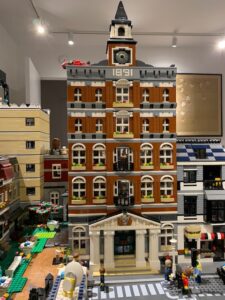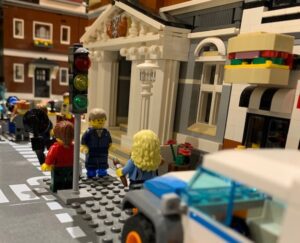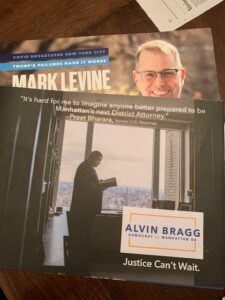City Elections 2021
This November the voters of New York City will elect a new mayor, along with district attorneys, city councilpeople, and other local offices. Despite a year of pandemic lockdowns, demonstrations for racial justice, and economic struggles of residents and businesses, New Yorkers seem disengaged so far. In a mostly Democratic city, the important election is the primary on June 22, and only a few weeks remain until the start of early voting.
The June primary is the first time for the implementation of ranked-choice voting (known in other places as the instant runoff), implemented to avoid costly runoff elections or the victory of a candidate in a crowded field with a sliver of the vote that happens to be larger than all the other candidates’ slivers. However, only the mayoral election will see ranked-choice voting; for all other elections, the top vote-getter will be the winner.
For those not familiar with the process, ranked-choice voting works like this: Each ballot has a line for choices 1 through 5. If one candidate gets over 50 percent, that candidate wins. Otherwise, the votes for the candidate who came in last are redistributed according to who their voters picked for their second choice. This continues until one candidate reaches 50 percent. It’s a good deal for voters who like the positions of multiple candidates in a crowded field but don’t want to guess at which one has the best chance to win.
With thirteen Democratic candidates on the ballot to succeed term-limited Mayor Bill deBlasio (along with two low-profile Republicans this time around), it seems that more people want to be mayor than vote for mayor. This is also true for the Manhattan district attorney position, with eight candidates running. Last Friday, I attended a Q&A with Alvin Bragg, the only Black candidate in the Manhattan DA race.
Years ago, I used to participate in political campaigns and through them met some lovely candidates who’ve gone on to do great things. I’ve retreated in the past few years to voting and nothing else, but I realized last year with democracy itself on the line that I might as well enjoy it while it lasts. That’s why I signed up for the event and encourage all of you, wherever you live, to do the same.
I also liked what I saw. There are more progressive candidates running for DA, ones who are committed to criminal justice reform in the vein of progressives in Philadelphia and San Francisco. Having served on a grand jury and thus more aware of how the system works from the prosecutor’s perspective, I wanted someone who would spend less time prosecuting nonviolent crimes and quality-of-life issues that could be taken care of in other venues without clogging the system. Bragg explained that the police are a poor fit for handling three areas where a lot of the conflict with marginalized communities emerges — people with mental illness, people who are unhoused, and school security. Rather than defunding police, he suggested transferring responsibility (with funding) for these areas to other agencies.
Bragg talked about his experience as a federal prosecutor and with the state attorney general’s office, dealing with cases of police misconduct. My concern with progressive candidates without prosecutorial experience is that they won’t pursue effectively the kinds of white collar crime that has been given a pass in recent decades. Had the previous Manhattan DA not dropped the ball for years on the Trump Organization, a certain demagogue would have a felony on his record and not have been able to realign politics in this country and make the loss of our democratic system a continued possibility.
I’ve been visiting websites of the mayoral candidates and hope to see some of them in person soon. I also signed up for the newsletters of other downballot candidates, among them my daughter’s former councilperson, Brad Lander, who is running for comptroller. Lander’s website is a treasure trove of information on covid-19, vaccine availability, and the city’s reopening process. It has driven home to me the message that elected officials exist to serve us and make our lives easier.
In his State of the Nation speech last week, President Biden talked about the competition between the world’s democracies and the world’s autocracies, and the message he heard from China’s dictator Xi and Russia’s dictator Putin that democracy is inefficient and poorly adapted to a fractious modern world. He wants to prove them wrong. He also heard from the other democratic countries that “America is back…but for how long?”
I worry that the lack of interest in local elections is evidence that people have grown tired of democracy and, regardless of their party affiliations, are coming to embrace the visions of Xi and Putin. I don’t think they understand fully the difference in the way a democratic government treats its people versus the way a dictatorship does. Despite the previous administration’s deadly failure in handing covid-19, I don’t think four years was enough time to convince people of the dangers of autocracy, but any more time would have precluded the possibility of reversing course.
Therefore, if you live in New York City, I urge you to find out more about the different local races and candidates, get involved, and vote. If you live anywhere else, do the same for your local and state races. Voting for our leaders and our representatives — which makes them accountable to us — is a right and privilege we enjoy that a lot of people around the world do not. We must use it so we don’t lose it.










Hi, Lyn–
I always appreciate reading your thoughts. It’s almost as good as actually talking with you.
You wrote (here) that “Bragg explained that the police are a poor fit for handling three areas where a lot of the conflict with marginalized communities emerges — people with mental illness, people who are unhoused, and school security. Rather than defunding police, he suggested transferring responsibility (with funding) for these areas to other agencies.”
What Bragg is suggesting is exactly what “defunding the police” is. Here’s a definition written by Michael Harriott in The Root:
“Substantively, there are many mechanisms to fight police brutality. Local officials can reduce the funding that allow local departments to militarize their forces. Federal laws can’t do much except standardize the policing and threaten to reduce the money to agencies that flout these laws. Cities can use financial means to force police unions to the table. Studies show that overpolicing produces more resistance over time and that removing police officers can actually reduce incidents of brutality. The most ambitious people want to dismantle police departments altogether and reimagine policing with a combination of criminal investigators, traffic regulators, mental health officials and community-oriented crime-stopping. All of these different ideas would require one thing in common: The reduction of taxpayers’ dollars to law enforcement agencies.”
In other words, reimagine public safety with less focus on the police.
Take care,
Beverly